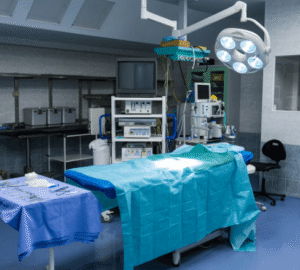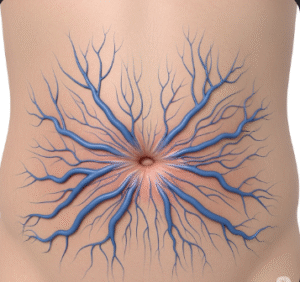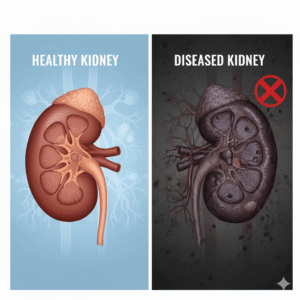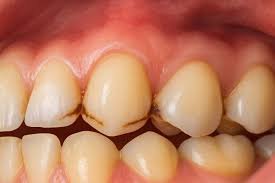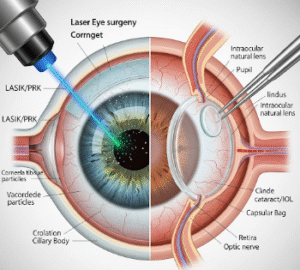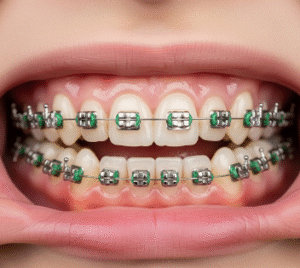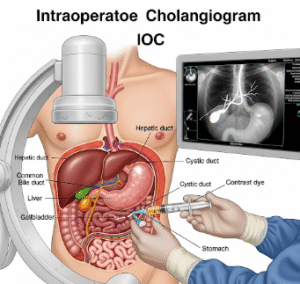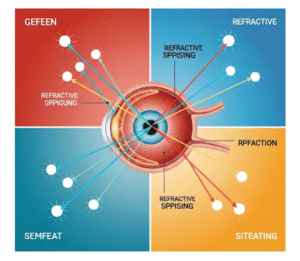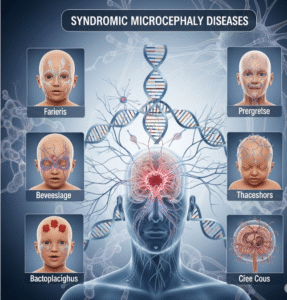Overview
Congenital Adrenal Hyperplasia (CAH) is a group of inherited disorders that affect the adrenal glands, leading to abnormal hormone production. The adrenal glands are responsible for producing cortisol, aldosterone, and androgens. In CAH, enzyme deficiencies disrupt this balance, often resulting in excess androgen production and insufficient cortisol or aldosterone. Early diagnosis and treatment are crucial to prevent serious complications such as adrenal crisis.
What is Congenital Adrenal Hyperplasia?
CAH is usually caused by mutations in genes responsible for producing adrenal enzymes, most commonly 21-hydroxylase deficiency. This enzyme deficiency reduces cortisol and aldosterone levels while increasing androgen levels, leading to symptoms such as ambiguous genitalia in females, rapid growth, or early puberty. CAH can range from mild to severe, with the classic form being more serious and often detected in newborn screening.
Symptoms
- Ambiguous genitalia in newborn girls
- Early signs of puberty (precocious puberty)
- Rapid growth during childhood but shorter adult height
- Excess facial or body hair (hirsutism)
- Irregular menstrual periods or infertility in females
- Fatigue, dehydration, and low blood pressure (in salt-wasting forms)
- Darkening of the skin (hyperpigmentation)
Causes
- Genetic mutations inherited in an autosomal recessive pattern
- Enzyme deficiencies, primarily 21-hydroxylase, less commonly 11-beta-hydroxylase or others
- Both parents carrying a defective gene increases the risk
Risk Factors
- Family history of CAH
- Parents carrying CAH-related gene mutations
- Consanguineous marriages (higher likelihood of recessive gene expression)
Complications
- Adrenal crisis (life-threatening if untreated)
- Salt-wasting crises causing dehydration and shock
- Fertility problems in both males and females
- Emotional and psychological challenges related to gender and development
- Osteoporosis and metabolic problems from long-term steroid use
Prevention
- Genetic counseling for families with a history of CAH
- Prenatal testing and early detection in at-risk pregnancies
- Regular newborn screening programs (available in Korea)
- Education on emergency management of adrenal crises
Treatment Options in Korea
South Korea offers advanced diagnostic and treatment facilities for CAH, including:
- Diagnosis
- Newborn screening programs routinely check for CAH
- Hormone level testing (17-hydroxyprogesterone)
- Genetic testing for enzyme deficiencies
- Imaging to assess adrenal glands and reproductive organs
- Medical Treatment
- Glucocorticoid replacement therapy to restore cortisol levels
- Mineralocorticoid therapy (fludrocortisone) for salt-wasting forms
- Salt supplements for infants if needed
- Emergency hydrocortisone injections for adrenal crises
- Surgical and Supportive Care
- Corrective surgery for genital abnormalities (if indicated)
- Psychological and gender support services
- Fertility counseling and reproductive health support
- Long-term Management
- Lifelong hormone therapy and dose adjustments
- Regular monitoring of growth, puberty, and hormone levels
- Multidisciplinary care including endocrinologists, surgeons, psychologists
- Specialized Centers in Korea
- Seoul National University Hospital – Pediatric Endocrinology
- Samsung Medical Center – Endocrine Genetics Clinic
- Asan Medical Center – Hormone Disorder Unit


